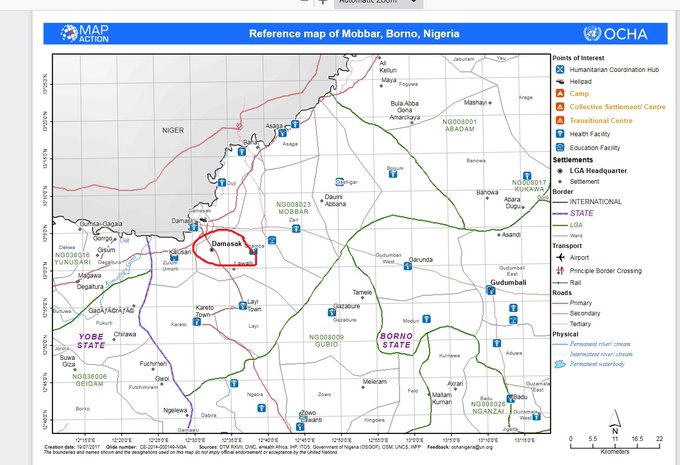Inside Nigeria’s Mortuaries – Story of Missing Bodies, Unclaimed Corpses

Corpses in many mortuaries in Nigeria have remained unclaimed for months on end, while poor documentation and identification sometimes lead to mix ups that have resulted in bodies being claimed by the wrong family.
LEADERSHIP Weekend findings revealed that Nigerians have continued to abandon corpses of their loved ones, leaving several morgues across the country with no option than to heap the corpses on improvised wooden platforms after embalmment.
Some state governments and the National Hospital, Abuja, had raised the alarm over the increasing number of unclaimed corpses in their mortuaries.
This paper spoke with health officials across several facilities in states to ascertain the situation that has left the country’s mortuaries poorly managed.
Our correspondent who visited some of the morgues observed that the private morgues are far better in terms of sanitation and hygiene than the public morgues where some yet to be identified corpses were still lying on the bare floor oozing foul smell that usually greets visitors as they approach the morgues.
In Imo State for instance, the harsh economic realities have resulted in many deaths, to the extent that the state’s over 180 morgues are crowded with corpses.
Speaking with LEADERSHIP Weekend, the Public Relations Officer, (PRO) Federal Medical Centre, Owerri, (FMC), Dr Jacy Achonu, said one of the greatest problems of the FMC morgue is lack of power supply.
According to her, the facility is powered by a generator on a regular basis, as the electricity supply hardly provides the facility with enough power. As a result, she said the facility depends mainly on the generator to power the morgue since it needs to be on regular power supply to function optimally.
Dr Achonu revealed that once a corpse is brought to the facility, the name of the deceased’s relative is recorded and the name and detailed information of the deceased is also recorded before a tally is issued to the relatives for identification.
In Delta State, it took a report that mortuary attendants at the Bomadi General Hospital in Bomadi local government area stack corpses on improvised wooden platforms after embalmment and bizarrely abandon them to the vagaries of the weather day and night to draw attention to the eyesore. It got to a stage where embalmed corpses were covered with blankets.
Workers, who spoke on condition of anonymity, said they were under pressure on a daily basis because of the challenges faced by patients.
They called on the government to resuscitate the hospital, which is the only government healthcare facility in the area.
“The hospital morgue too is an eye sore; our revered and deceased parents are dried right outside in the sun like Bonga fish,” one of them said.
In some hospitals, those on sick beds always see corpses that are carried through the wards to the mortuary while in some, corpses litter the premises due to lack of space.
Leader of Bomadi Legislative Assembly, Hon Bekes Tonprebofa, who was a patient in the hospital, complained bitterly about the state of the facility, appealing to the state government to do the needful in the hospital.
He noted that the dilapidated health-care facility in the riverside community suffers lack of space to preserve the dead bodies in the hospital’s overflowing mortuary.
On the dead bodies kept outside the morgue, he said, “Corpses are now placed outside the mortuary because of space, which also needs upgrading.”
At the Federal Medical Center, (FMC), Asaba, it was learnt that whenever the death occurs, the hospital staff would first ascertain whether the family of the dead is indebted to the hospital or not.
Once cleared, the hospital will provide certification of death which would be presented to the mortician before the corpse is accepted at the mortuary air-conditioned space or embalmment section as decided by the family.
Then former chairman of Bomadi local government area, Chief Oluwole Karetimi, had said the health facility required complete renovation and rehabilitation, adding that government has not upgraded it since its commissioning in the early 1970s.
Karetimi asserted: “I appeal to the state government to undertake complete renovation and upgrading of the hospital. Now that we cannot assist the state government because of financial incapability, we appeal to the Hospital Management Board, HMB, Asaba, and our amiable governor to quickly come to our aid.”
He advised that if people keep their dead in the mortuary for more than two years as reported, then the management of the hospital should formally write to the families concerned and give mass burial to such corpses if they refuse to take them.
Also, the traditional ruler of Kpakiama urban community, Chief Ambakederemo Bunu, warned if corpses litter the premises of the mortuary it could lead to outbreak of both air and water-borne diseases.
On his part, chairman of Bomadi community, Hon. Stephen Muturu, said it was palatable for those on sick bed to always see corpses being carried through the wards to the mortuary.
He advised government to fence the mortuary and construct a road from the fence at the backside to carry dead bodies.”
Findings re-vealed that there were about 280 abandoned corpses in the hospital’s mortuary.
A hospital source, who spoke with our correspondent on condition of anonymity, said the situ-ation has gotten to a point where bodies a-re evacuated directly from the ward to a waiting casket.
“Ordinarily, when a patient dies, the corpse is taken to the morgue for embal-mment and whatever that needs to be done. It is from th-ere that families go to claim the remains of their relatives. It was absurd when we discovered that co-rpses were being mov-ed from the ward wh-ere the patient died directly into a ca-sket because there is no more space at the morgue,” the source added.
On her part, a woman who lost her mother recently, Mrs Efe Oke, said, “We went through five mortuaries searching for a space to deposit my mother but we couldn’t find any. We visited five mortuaries; they said they were filled up already and even some corpses were kept under the mango tree”.
The chief medical director of FCM, Dr Victor Osiatuma, said the mor-gue with a car-rying capacity for 67 bodies now has 21-0 corpses.
The management of the hospital at a point was forced to put out a notice for the pu-blic to retrieve and bury their dead lov-ed ones within the next month, after whi-ch it could resort to mass burial of unc-laimed corpses.
In Plateau State, LEADERSHIP Weekend gathered that the problem is usually that most people keep their corpses for a long time.
Most of the mortuaries in Jos that were visited by our correspondent looked unkempt and in most cases corpses are left on the ground of the parlour of the morgues after embalmment.
It would be recalled that there was a pandemonium last month in Jos, the Plateau State capital, following the exchange of the body of a 33-year-old David Atimbi Adi who was mistakenly given to a family for burial by authorities of Bingham University Teaching Hospital BUTH, Jos.
Trouble started when family members of the deceased from Bassa local government area stormed the hospital with buses to convey the body for burial but discovered that the corpse was not at the mortuary.
The deceased family blocked the entrance to the hospital, causing heavy gridlock, as they demanded that the management of the hospital must provide the corpse.
It was gathered that though the body was the last to be deposited at the hospital, the corpse was not found in the morgue.
A brother to the deceased, Paul Atimbi, who spoke with journalists, said they had gone to BUTH mortuary only to discover that the body was not in the mortuary.
The body was apparently released to a different family and was buried at Mista Ali in Bassa local government area of the state.
The management of the hospital, after intensive pressure, went to the village and exhumed the decomposed body which was handed over to the legitimate family.
The BUTH chief medical director (CMD), Stephen Anzaku, blamed the mortician on duty for mislabeling of the body.
The management of the morgue is one of the most tedious and challenging work to do, especially in most of Nigeria’s health institutions.
This is more serious in public health institutions, like state and federal tertiary health institutions, general hospitals, comprehensive health centres and other health centres.
In Ekiti state, morgues in all categories of health institutions in the state are, to an extent, receiving attention in terms of how they are being kept, managed and maintained.
Still, there are various challenges in maintaining the morgues. A source close to the Ekiti State University Teaching Hospital, Ado Ekiti (EKSUTH), said the most serious challenge is the limited morgue capacity.
The source who did not want his name in print noted that the delay by the people in claiming their corpses usually aggravate the problem.
He outlined problems to include limited morgue attendants, equipment, unfulfilled financial obligations of the corpse’s family among others.
He said N500 and N700 is to be paid per day by the owners of the corpses from the day the dead is deposited at the morgue to the day the body is retrieved for burial.
The amount payable, according to him, differs from one health institution to another, even as the service cost only N500 at a federal health institution in the state.
In Benue State, our correspondent gathered that all the mortuaries are leased out to private firms, except that of the Federal Medical Center (FMC), Makurdi, and as such, the government does not have control over them in terms of management.
It was also gathered that the firms take care of morgues at their own cost and share a percentage of the profit with the government.
When our correspondent visited some of the public morgues in the state, some of the attendants who spoke on condition of anonymity explained that chemicals for preservation of dead bodies are supplied by the firm handling the morgue.
“Although as mortuary attendants we are not supposed to speak about what is happening here because this is another world on its own, I can tell you that we are doing exactly what a standard mortuary is supposed to do in terms of preserving corpses,” he said.
Lamenting a situation where some people keep dead bodies for long, which is the reasons some of the morgues do not have space and are choked, he urged people to try as much as they could to buried their loved ones as soon as possible, adding that keeping dead bodies for long will not wake the person again.
“That is one of the basic challenges we are facing; some people keep corpses of their relatives for three to five and even eight months, which for me is not good enough. So let us imbibe the culture of burying our loved ones as soon as possible so that the pains will get out of our minds.”
By Leadership.



